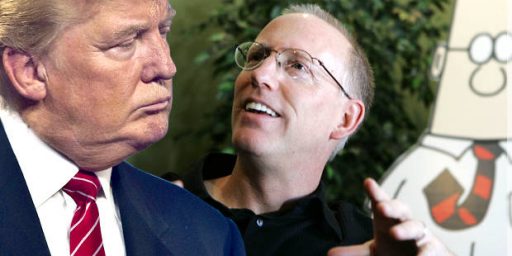Kinsley’s Pity Party
Michael Kinsley published the same op-ed in two major papers today. (Granted, he’s editorial page editor of one of them.)
Am I Blue? – I apologize for everything I believe in. May I go now? (WaPo)
Am I Blue? – I apologize for everything I believe in. May I go now? (LAT)
People have different mixes of values, and states have different mixes of people. More than 50 million, or 44%, of the 115 million citizens who voted for either George W. Bush or John F. Kerry on Tuesday live in states that went for the other guy. These misfits go out in public, mingle with others and often are treated like normal human beings. (For the half-million that voted for Ralph Nader, it may be a different story.)
A point worth noting, to be sure. See the Purple America maps.
A moment of surprising resonance in the campaign was Jon Stewart’s Oct. 15 appearance on “Crossfire.” Taking just a tad too seriously his recent appointment by acclamation as the Walter Cronkite of our time, Stewart begged the show’s hosts to “stop hurting America” with their divisiveness. I used to work on that show, and I still think the robust, even raucous, and ideologically undisguised hammering of politicians on “Crossfire” is more intellectually honest than more decorous shows where journalists either pretend neutrality or pontificate as if somebody had voted them into office.
I haven’t watched the show much the last couple of years, finding it completely unwatchable nowadays. I hardly missed an episode during the Mike Kinsley-Pat Buchanan golden era of the show, as both men were solid debaters willing to actually concede valid arguments were being made by opponents. While James Carville is a brilliant political analyst, he’s a goddawul hack when he’s wearing his “party spokesman” hat. Bob Novak is an excellent reporter but is a characture of himself on television. Tucker Carlson is a ninny, although often an affable one. Paul Begala is occasionally charming and bright but seldom so on the program.
Still, Kinsley’s larger point is well taken: Spirited debate is a good thing for a democracy. Indeed, it’s essential. Bipartisanship and cooperation are good if they simply mean honorable dealing with those across the aisle; they’re a bad thing is they take the form of selling out core principles without gaining major concessions in return.
Unfortunately, the piece goes downhill from there, turning into the standard “we lost to a bunch of ignorant, racist hicks” nonsense.
There’s just one little request I have. If it’s not too much trouble, of course. Call me profoundly misguided if you want. Call me immoral if you must. But could you please stop calling me arrogant and elitist?
I mean, look at it this way. (If you don’t mind, that is.) It’s true that people on my side of the divide want to live in a society where women are free to choose and where gay relationships have civil equality with straight ones. And you want to live in a society where the opposite is true. These are some of those conflicting values everyone is talking about. But at least my values — as deplorable as I’m sure they are — don’t involve any direct imposition on you. We don’t want to force you to have an abortion or to marry someone of the same sex, whereas you do want to close out those possibilities for us. Which is more arrogant?
We on my side of the great divide don’t, for the most part, believe that our values are direct orders from God. We don’t claim that they are immutable and beyond argument. We are, if anything, crippled by reason and open-mindedness, by a desire to persuade rather than insist. Which philosophy is more elitist? Which is more contemptuous of people who disagree?
I would note that Kinsley’s side spent two years and record millions of dollars trying to persuade and came up 3.5 million votes short. That’s fine–the losing side isn’t by definition wrong. But dishonest characterization of the motivations of the majority is hardly evidence of “reason and open-mindedness.”
If one side believes that the fetus is a human being and that killing it is therefore immoral, it’s rather silly to argue that allowing those who feel otherwise to kill their babies imposes no effect on others. Similarly, if one side feels that marriage is a unique institution fundamental to a decent society, then a radical change in that institution imposed by the minority is detrimental to their interests. Kinsley certainly knows that.
Kinsley and his side have so far failed to change the minds of the majority on this and other issues. Rather than simply continuing to work at persuasion, however, they’ve sought–with great success–to impose their minority will through the most undemocratic institution in our society, the judiciary. Ironically, the result of this has been to polarize this debate and energize the majority against these policies even when persuasion has worked.
While Roe v. Wade made abortion legal nationally, it created a permanent anger that motivates a huge chunk of the electorate against Kinsley’s candidates. Absent Roe, abortion would still be legal in most states–through democratic persuasion, no less–and opponents would be unorganized and apathetic. Ditto the gay marriage issue, which was incredibly tangential to American politics before the Massachusetts Supreme Court imposed it against the majority will of even the most liberal state in the Union. As homosexuality becomes more normalized via the popular culture, civil unions or at least legal rights for gay couples (survivorship, hospital visitation, insurance benefits, etc.) were already becoming more widespread. But the fear, especially in the more culturally conservative parts of the country, that Kerry-appointed judges would do the same thing nationally scared the hell out of people and helped mobilize them.
The country needs an opposition party to challenge the conventional wisdom and push for change. I don’t expect Kinsley or other liberals to become conservatives just because they’ve lost a couple of elections. But, if they wish to be an effective opposition party–let alone challenge to become the dominant party again–they need to at least pay attention to the things that motivate most people. There’s a way to frame gay marriage and other liberal issues in a way that they’ll appeal to a majority. But insulting the intelligence of that majority is not likely it.






Whining is so unattractive.